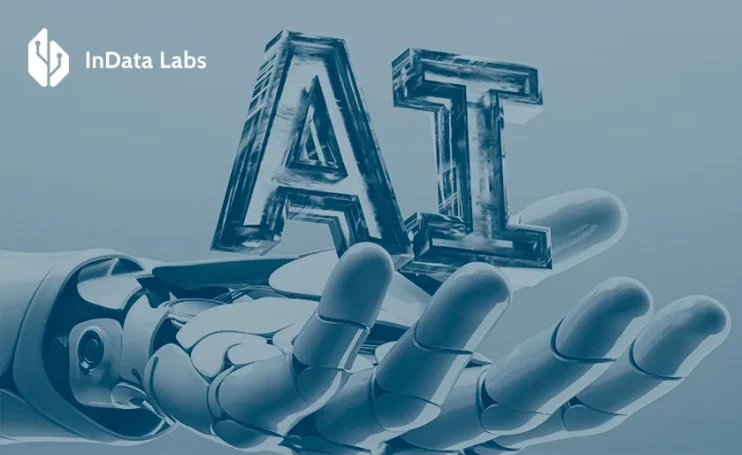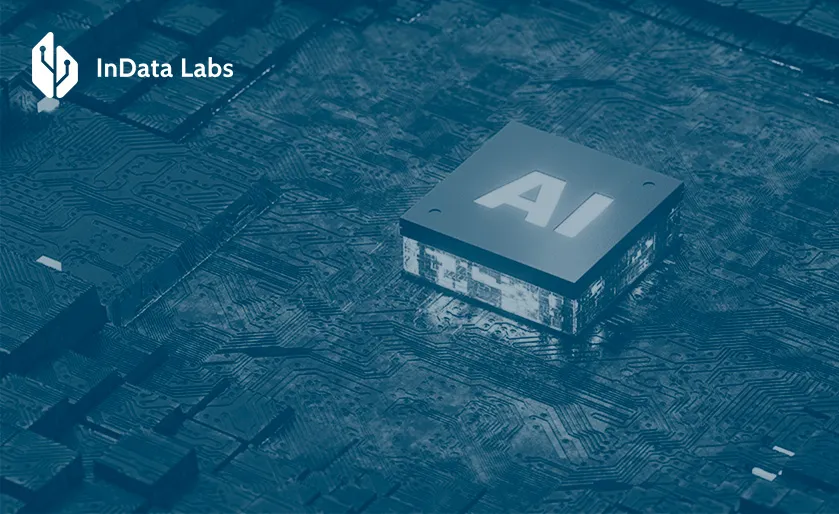As AI is becoming more and more integrated into regular business operations, a lot of companies opt for an external consultant to help them make better decisions, streamline their operational processes, or simply improve the customer experience. AI solutions can be complex to implement and require a degree of technical acumen, strategic thinking, as well as understanding of how they will fit into the business process — all of this an AI consultant can bring.

This post is dedicated to the crucial responsibilities, roles, and day-to-day tasks of a generative AI consultant, who has already emerged as a non-fungible resource for almost every business sector.
What is an AI consultant?
An AI consultant is a professional who specializes in providing organizations with guidance on artificial intelligence use issues. They assist businesses in taking advantage of AI’s promise by bridging the gap between the technology’s intricacies and its demands.

Source: Unsplash
What do AI consultants do? The responsibilities of an AI consultant is to give counsel and pick the cases for using artificial intelligence (AI). They also check for the tools and implements best suited for certain cases. The most important function is the improvement of business performance and measurable productive changes in business activity for which a consultant remains at work.
Why to apply to AI consultants?
- Increasing complexity of AI. Businesses find machine learning, computer vision, and NLP difficult to implement without taking the help of expert AI management consulting.
- Lack of in-house expertise. Few companies have the expertise necessary to design and implement custom AI solutions.
- Strategic value of AI. Artificial intelligence can provide significant value to businesses, but only if used in ways that support them drive towards their strategic objectives.
Why do companies need AI consultants?
Expert AI consultant is an important part of any business looking to utilize AI. AI consultants have a lot to offer businesses of all sizes, from small business owners through medium-sized up to enterprise. Let’s learn about some of the prime reasons companies hire AI consultants.
Breaking the AI expertise barrier
Many organizations lack the skills necessary to implement AI-powered solutions and use AI tools because they need the understanding of algorithms, data processing, and software development. This knowledge is brought by an AI consultant, who gives AI initiatives a strong basis.
AI as a business differentiator
AI may provide companies with a major competitive advantage in a variety of areas, including supply chain optimization and customer experience personalization. But there is very little room for error due to AI’s complexity.

Obtaining strategic AI guidance
Aligning AI solutions with business strategy is a more important aspect of using AI than just integrating new technology. AI consulting provides a broad perspective, assisting businesses in creating concise AI roadmaps that optimize return on investment. In addition to ensuring that these tactics are successful, a certified AI consultant also makes sure they adhere to industry best practices and standards.
Handling AI obstacles
Projects involving AI may be difficult, with problems ranging from integrating with current systems to data quality. A knowledgeable AI consultant offers specialized solutions to address particular demands, assisting companies in navigating these obstacles. Additionally, they guarantee the early reduction of possible hazards, averting expensive implementation delays or failures.

Source: Unsplash
Key roles of an AI consultant
AI consultants play many important roles in the AI implementation process. Here is a list of the typical roles and responsibilities they perform. We’ll also touch on the AI models that assist enterprises with selecting, building, and operationalizing for success in a range of real-world scenarios.
Development of AI strategy
Businesses must have a defined AI strategy in place before initiating any AI projects. Companies may develop an AI deployment plan that supports their long-term business objectives with the assistance of data and AI experts.
Predictive analytics models to identify trends in consumer behavior and direct long-term AI initiatives in line with corporate objectives are the AI models they suggest. It entails establishing goals, choosing the best AI use cases, and assessing any hazards. It also involves addressing the challenges of AI adoption while calculating the return on investment of AI efforts.
For instance, a retail business wishing to employ AI for client customization might hire a consultant to design a plan that prioritizes increasing sales and customer engagement. This involves determining which artificial intelligence (AI) software development technologies to use in order to create customized recommendation engines and enhance the shopping experience.
Technical advisory
Analytics and AI consultants company specialists have in-depth knowledge and experience with AI ML, Deep Learning, or NLP technologies. They also recommend to companies what AI tools, platforms, machine learning models, and frameworks businesses should be using depending on their needs. Their recommended AI models include classification models to assist financial services companies in identifying fraudulent activity, including logistic regression or support vector machines.
It entails suggesting the best AI platforms, algorithms, and technologies to address certain business problems. As an illustration, you can imagine assisting a financial services company in selecting cloud-based AI platforms for fraud detection systems, such as Google Cloud or Amazon Web Services (AWS).
Design and implementation of AI system
To build and execute AI systems, development teams collaborate closely with responsible AI consultants. This entails using AI-driven tools, building machine learning models, and making sure that current systems are properly integrated.

Source: Unsplash
They develop artificial intelligence (AI) recommendation algorithms, such as neural networks or collaborative filtering methods, that may provide e-commerce platforms with tailored product recommendations. What is more, they work together to create and implement AI models that are suited to the demands of the business alongside data scientists and software engineers.
As an example, consider creating a recommendation system for an online retailer that provides clients with tailored product recommendations based on their browsing and purchasing patterns. AI-driven customer support and engagement elements are integrated with the assistance of a conversational AI consultant.
In-house teams collaboration
AI consultants collaborate with one another. To make sure that AI initiatives are incorporated into current workflows and procedures, they work in conjunction with a variety of internal teams, including those in IT, data science, and business divisions.
Natural language processing (NLP) models to provide customer insight tools, enabling marketing teams to more efficiently assess consumer feedback and sentiment, are examples of AI models that they may assist in integrating. It entails promoting interdepartmental cooperation and guaranteeing that AI systems complement technical and commercial goals. A relevant example is developing and implementing AI-driven consumer insights tools and doing marketing analysis in collaboration with a company’s marketing analysis.

Source: Unsplash
Hence, it is evident that AI consultants are essential in helping companies navigate the challenges of developing AI strategies, providing technical advice, designing systems, and working with internal teams. Their experience not only increases the efficacy of AI projects but also synchronizes them with overarching corporate goals.
How much does it cost to hire an AI consultant? All things considered, the IT consultant hourly rate can vary greatly depending on experience and project complexity; it usually ranges from $100 to $300 per hour, depending on the particular needs of the project and the consultant’s experience.
Core responsibilities of AI consultant for small business and enterprises
In addition to higher strategy, an artificial intelligence consultant works on functionalities of AI systems from the development phase up until deployment. The following are some of the main responsibilities or roles you should be familiar with AI consultants.
-
Identifying AI use cases
AI consultants inspect the current working model of their business to understand where they can contribute through artificial intelligence. They make a list of AI use cases for automation gain, predictive analysis, customer service enhancement, etc., often scoping in resultant insights from the generative intelligence consultant to drive creativity and solution efficacy.
There are two key steps to achieve this: conducting a comprehensive business analysis to reveal endless opportunities for AI implementation. A simple application of this is assisting a logistics business in understanding how AI can solve not-so-simple problems for it — like demand prediction, inventory management, etc.
-
Data preparation and analysis
AI consultants are excellent at managing AI, a technology that relies on massive volumes of data. Along with addressing data quality concerns, cleaning datasets, and organizing data for machine learning solutions, they make sure that data is not merely prepared and organized but also done with exacting attention to detail.
This procedure involves the important duties of addressing missing values, cleaning, preparing data, and making sure the data is adequate for training AI models. For example, preparing customer data to create a churn prediction model for a telecom company.

Source: Unsplash
-
Choosing the appropriate AI tools and platforms
Depending on their particular requirements, artificial intelligence consultants assist organizations in selecting the best AI platforms and technologies, whether they need an on-premises or cloud-based solution. This approach entails assessing several AI platforms and tools in light of the financial, technological, and organizational objectives of the business.
For a bigger company, a certified artificial intelligence consultant would advise a more complicated on-premise solution, but for a startup, they might offer a cloud-based AI platform. In the end, these decisions have a significant impact on how well the AI implementation process goes overall.
-
Training and evaluation of AI model
AI consultants supervise the creation of AI models, making certain that they are appropriately trained, verified, and tested prior to implementation. They keep an eye on the model’s performance to ensure it lives up to the business’s requirements. Building, evaluating, and iterating AI models are all part of this procedure, which guarantees correctness and facilitates efficient AI growth.
For instance, generative AI consultants could concentrate on creating and improving a machine learning model to forecast patient outcomes using past data for a healthcare organization.
-
Monitoring and maintenance after deployment
Following deployment, advisors keep an eye on the AI system’s performance and make tweaks as needed to keep it meeting business requirements. Consulting firms are essential to this continuous process because they offer the knowledge and experience required to properly fine-tune AI systems.
What steps does this procedure involve? The AI system must first be checked for relevance and correctness. Models must be updated as needed, and scalability must be guaranteed. When implementing these changes, conscientious AI consultants keep ethics in mind. For instance, they may keep an eye on generative AI development to make sure it accurately anticipates when equipment needs to be serviced. This is especially relevant when developing generative AI to create predictive models.
Numerous intricate duties are included in a position as demanding as an AI consultant. However, by concentrating on gaining pertinent skills and expertise in AI technology, data analysis, and business strategy, one might become a gen AI consultant without any prior experience. You may obtain knowledge and practical expertise by working with consulting businesses that specialize in AI-powered software development, particularly in areas like development and implementation. Aspiring professionals can also begin by looking for internships or entry-level positions in IT companies, or they can work as AI consultants to bolster their experience and portfolio.
Everyday activities of an AI consultant
Now, let’s revise the key everyday activities of an AI consultant. Most AI consultants spend their time dealing with both strategic and technical tasks. But these tasks may typically depend on the project and client.
Clients’ needs analysis. One of the central tasks of a gen AI consultant is understanding the client’s business needs and challenges. It includes regular meetings with business owners and stakeholders, analysis of clients’ business processes, and identification of aspects where AI can generate better results.
AI solutions prototyping. Most AI consultants create small prototypes for testing the feasibility of their solutions. It helps them understand which AI tools can be suitable for the business and what impact these tools can bring.
Internal teams’ training. Several AI consultants also educate business teams on how to use AI systems for business, maintain those systems etc. These trainings help ensure that employees have the skills required for utilizing AI tools.
AI models troubleshooting. There are numerous possible challenges and difficulties an artificial intelligence system may face, and the model may need some troubleshooting. The challenges may range from the low quality of data to inaccurate predictions. AI consultants should work with these problems’ solutions.
Establishing communication with stakeholders. Naturally, AI consultants spend much time communicating with business owners and stakeholders and explaining some concepts to non-tech people. They also often provide regular performance reports.
The most essential skills for AI consultants
AI consultants should possess a variety of different skills in order to bridge the gap between business and technology successfully. These skills include:
- Tech expertise. AI consultants must be proficient in a variety of technologies that are crucial for AI, including machine learning algorithms, deep learning models, NLP, and computer vision, among others. In addition to that, the consultant should have a good grasp of programming languages like Python, R, and SQL, as well as AI platforms such as TensorFlow and PyTorch.
- Business acumen. Analytics and AI consultants should know how to align AI initiatives with business needs, implying a deep understanding of business processes, strategies, and market conditions.
- Communication skills. AI professionals, including machine learning consultants, should communicate complex AI topics to their stakeholders in plain language. In addition to that, these consultants should be able to present their ideas precisely and succinctly to make sure that all their stakeholders understand the propositions and rationale behind them.
- Problem-solving ability. AI consultants are usually called in to solve complicated problems, whether it is choosing the right AI software or fixing a problem in a machine learning model.
Conclusion
AI is revolutionizing different industries, but the right guidance is necessary for businesses to make it a success. Responsible artificial intelligence consultants are crucial for helping companies identify opportunities for AI, creating strategic plans, and rolling out AI technologies that are in line with their goals. By knowing all the technical and business sides of AI, these consultants help organizations bridge the gap between innovation and implementation, ensuring that AI technologies are fully used.
As AI technology gets more advanced, the importance of AI consultants is only going to grow. If you require the services of an artificial intelligence consultant, you can approach one of the many software development consulting firms that offer these services. This way, you will receive expert help and will have no trouble achieving your business goals with AI.



